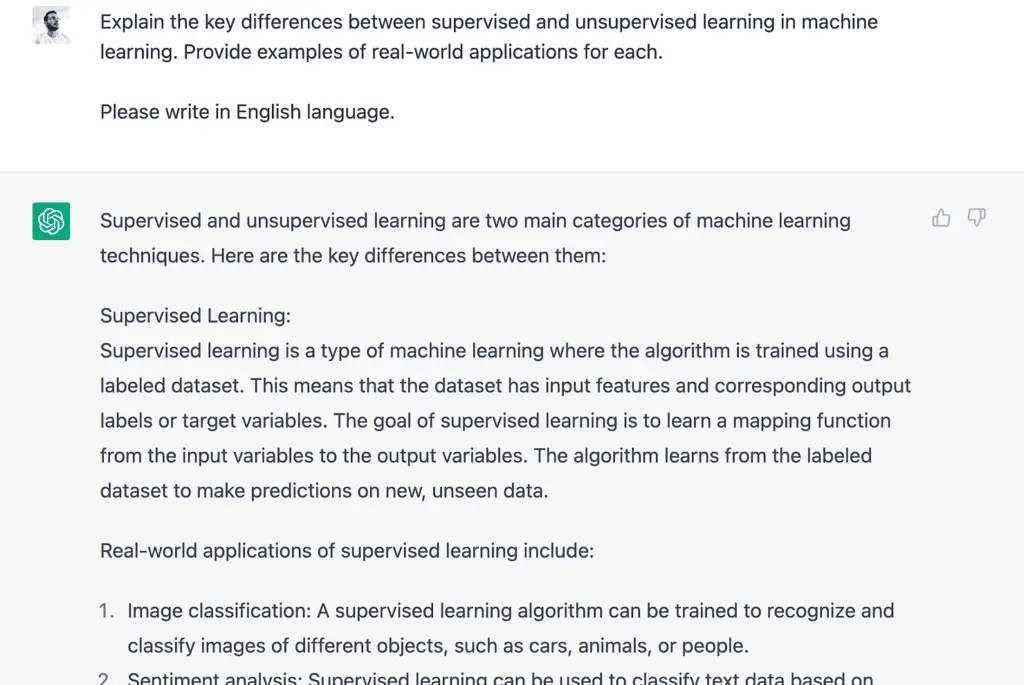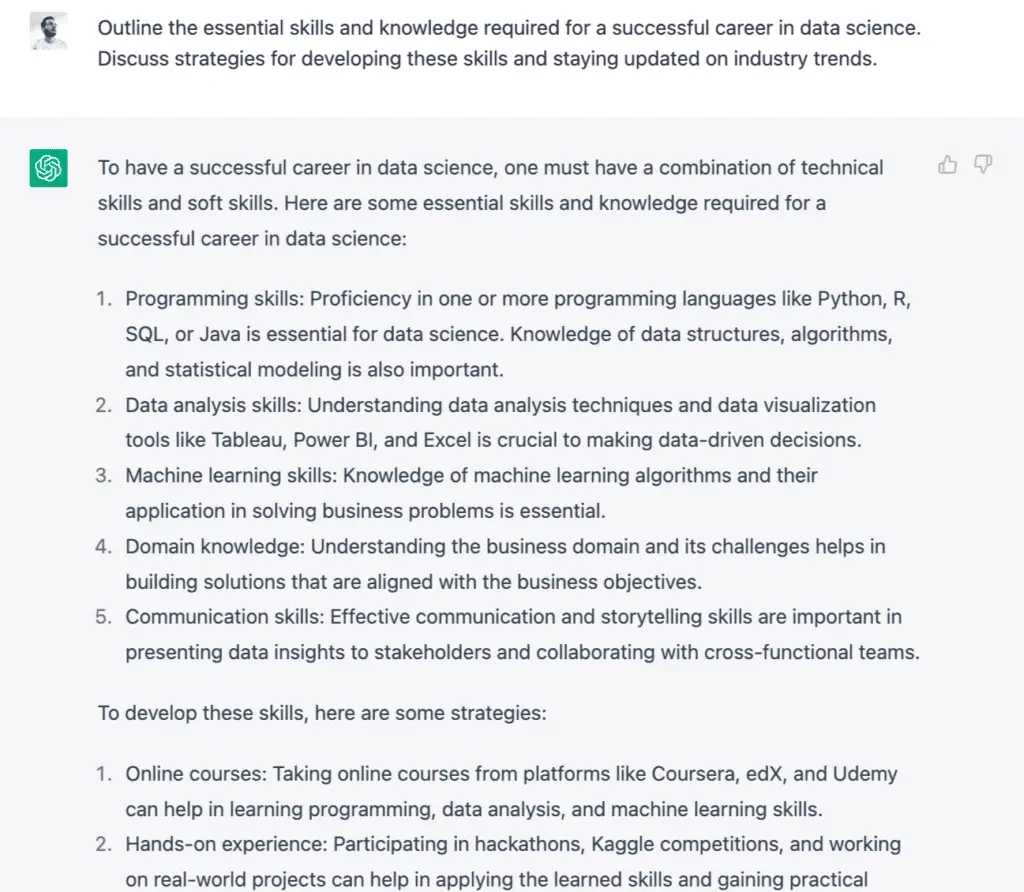Data science is a constantly evolving field that requires continuous learning and collaboration. In this blog post, we’ll explore how data scientists can leverage ChatGPT prompts to improve their skills, work more efficiently, and stay updated on the latest industry trends.
The GPTPromptsHub team has curated 100+ long-form prompts for various data science use cases, from learning new concepts to collaborating with other professionals.
The Role of ChatGPT in Data Science Learning
The ever-evolving field of data science requires constant learning and adaptation, and ChatGPT can play an instrumental role in this process. As an AI language model, ChatGPT can help data science professionals and learners in several ways, making it an indispensable resource for acquiring new skills and staying up to date with the latest industry trends.
A. Personalized Learning Assistance
One of the most significant benefits of using ChatGPT for data science learning is its ability to provide personalized assistance. By understanding the context of a user’s query, ChatGPT can deliver tailored explanations, examples, and resources to help learners better comprehend complex data science concepts.
B. Access to Diverse Learning Resources
ChatGPT’s extensive knowledge base enables it to recommend a wide range of learning resources for data science. These resources may include articles, tutorials, online courses, books, and videos from reputable sources. This ensures that learners have access to diverse, high-quality materials to aid in their learning journey.
C. Interactive Learning Environment
Traditional learning methods can sometimes be passive and monotonous, making it difficult to stay engaged. ChatGPT, on the other hand, provides an interactive learning environment, enabling users to ask questions, receive immediate feedback, and engage in conversations about data science topics. This dynamic learning experience fosters a deeper understanding and helps to solidify knowledge.
D. Practice Problem Generation
ChatGPT can generate practice problems and coding challenges related to various data science topics, allowing learners to test their knowledge and develop problem-solving skills. By working through these problems, learners can identify areas of weakness and focus their efforts on improving those specific skills.
E. Code Explanation and Debugging Assistance
Understanding and debugging code can be a challenging aspect of learning data science. ChatGPT can help learners by providing explanations for specific code snippets, offering suggestions for improvements, and even assisting with debugging issues. This support makes it easier for learners to develop their coding skills and overcome common roadblocks.
F. Staying Current with Industry Trends
Data science is an ever-changing field, and staying up to date with the latest advancements is essential for professionals and learners alike. ChatGPT can provide information on recent developments, emerging technologies, and new methodologies, ensuring that users are aware of the latest trends and best practices in the industry.
G. Networking and Collaboration
ChatGPT can also assist in networking and collaboration within the data science community. By generating conversation starters or discussion topics, users can engage with peers, mentors, and industry experts, fostering a collaborative learning environment and expanding their professional network.
ChatGPT has the potential to revolutionize data science learning by offering personalized assistance, diverse learning resources, an interactive environment, and various other benefits. By leveraging this powerful AI tool, data science professionals and learners can continually enhance their skills and stay ahead in the rapidly evolving field of data science.
Read: How Businesses Can Leverage ChatGPT Prompts Read: Best ChatGPT Prompts For Developers
Best ChatGPT Prompts for Learning Data Science Concepts

- “Explain the key differences between supervised and unsupervised learning in machine learning. Provide examples of real-world applications for each.”
- “Describe the process of k-means clustering and discuss its advantages and limitations. Provide a step-by-step walkthrough for implementing k-means clustering in Python.”
- “Outline the main components of a neural network and explain how backpropagation works in training neural networks. Include an example to illustrate the concept.”
- “Discuss the concept of regularization in machine learning, focusing on the differences between L1 and L2 regularization. Provide examples of when to use each type of regularization and how to implement them in Python.”
- “Explain how decision trees work, their advantages and disadvantages, and how they can be used for both classification and regression tasks. Include a practical example and code snippet in Python.”
- “Describe the main steps in a typical data preprocessing pipeline, including techniques for handling missing data, outliers, and categorical variables. Provide Python code examples for each step.”
- “Discuss the concept of ensemble learning, specifically focusing on bagging and boosting techniques. Include real-world examples and Python code to demonstrate their implementation.”
- “Explain the process of cross-validation in model evaluation and discuss its benefits over a simple train-test split. Provide an example with Python code to illustrate k-fold cross-validation.”
- “Outline the key differences between Principal Component Analysis (PCA) and t-Distributed Stochastic Neighbor Embedding (t-SNE) for dimensionality reduction. Provide examples of when to use each technique and how to implement them in Python.”
- “Discuss the importance of feature engineering in machine learning, providing examples of feature creation, feature transformation, and feature selection techniques. Include Python code snippets for each technique.”
Read: ChatGPT Prompts Curated For Teachers
ChatGPT Prompts for Collaboration and Problem-Solving in Data Science
- “Describe a challenging data science problem you have encountered and the steps you took to overcome it. Include the techniques you used, any obstacles you faced, and the lessons you learned.”
- “Share an example of a data science project where collaboration was crucial to success. Discuss the roles of team members, how you communicated effectively, and the tools you used to manage the project.”
- “Describe a situation where you had to troubleshoot a poorly performing machine learning model. Explain the steps you took to diagnose the issue, the changes you made to improve the model’s performance, and the final results.”
- “Share an example of a successful data-driven decision made within your organization. Discuss the data analysis process, the insights gained, and the impact of the decision on the organization’s performance.”
- “Describe a time when you had to communicate complex data science concepts to a non-technical audience. Explain the strategies you used to make the information accessible and the feedback you received.”
- “Share your experience working with a specific data science library or tool that you found particularly helpful. Discuss the features you found most useful, any challenges you faced, and tips for other data scientists using the same library or tool.”
- “Describe a situation where you had to deal with imbalanced data in a classification problem. Explain the techniques you used to address the imbalance and the impact it had on model performance.”
- “Share an example of a data science project where you had to work with a large dataset. Discuss the challenges you faced in handling the data, the tools and techniques you used to manage it, and the lessons you learned.”
- “Describe a situation where you had to adapt a data science solution to changing requirements or constraints. Explain how you adjusted your approach, the challenges you faced, and the outcome.”
- “Share your experience learning a new data science concept or technique from an online resource, such as a blog, video, or tutorial. Discuss the quality of the resource, how it helped you, and any recommendations for others looking to learn the same concept or technique.”
ChatGPT Prompts for Staying Updated on Data Science Trends
- “Discuss the current state of natural language processing (NLP) and its potential applications in various industries. Include recent advancements and future trends in the field.”
- “Explain the concept of reinforcement learning and its applications in real-world scenarios. Discuss recent developments and the future potential of reinforcement learning.”
- “Outline the emerging trends in data visualization and their implications for data scientists. Include examples of innovative visualization techniques and tools.”
- “Discuss the role of ethics in data science, focusing on the importance of responsible AI and privacy concerns. Include examples of ethical dilemmas faced by data scientists and potential solutions.”
- “Explain the concept of edge computing and its potential impact on data science and machine learning. Discuss the advantages and challenges of implementing edge computing in real-world scenarios.”
- “Describe the growing importance of data privacy and security in the data science field. Discuss recent regulations and best practices for protecting sensitive information.”
- “Outline the advancements in quantum computing and their potential implications for data science and machine learning. Discuss the challenges and opportunities in integrating quantum computing with traditional data science techniques.”
- “Explain the concept of federated learning and its potential benefits and challenges for data scientists. Include examples of real-world use cases and the future potential of federated learning.”
- “Discuss the role of data science in the Internet of Things (IoT) ecosystem. Explain the challenges and opportunities in processing and analyzing data from IoT devices.”
- “Outline the potential impact of blockchain technology on data science and machine learning. Discuss the advantages and challenges of implementing blockchain-based solutions in various industries.”
ChatGPT Prompts for Data Science Job Interviews
- “Explain how you would approach a data science project from start to finish. Include the steps you would take for data gathering, preprocessing, model selection, evaluation, and deployment.”
- “Describe your experience working with different machine learning algorithms. Explain your preferred algorithm for a classification problem and discuss its strengths and weaknesses.”
- “Discuss your approach to feature selection in a machine learning project. Explain the methods you use to identify important features and how you handle multicollinearity and other challenges.”
- “Provide an example of a time when you had to optimize a machine learning model’s performance. Explain the hyperparameter tuning techniques you used and the impact on the model’s accuracy and efficiency.”
- “Describe a situation where you had to deal with missing data in a dataset. Explain the strategies you used to handle the missing data and the impact on the final results.”
- “Explain your experience with different programming languages and tools commonly used in data science. Discuss your preferred programming language and the reasons behind your choice.”
- “Describe a time when you had to work with a difficult team member in a data science project. Explain the challenges you faced and how you overcame them to ensure the project’s success.”
- “Share an example of how you have used data visualization to communicate complex results to stakeholders. Discuss the tools and techniques you employed and the feedback you received from the audience.”
- “Explain your approach to validating a machine learning model and the metrics you use to evaluate its performance. Discuss how you handle situations where a model is overfitting or underfitting.”
- “Describe a time when you had to learn a new data science technique or tool quickly to meet a project deadline. Explain the resources you used and how you managed to successfully integrate the new knowledge into the project.”
We would suggest you read our blog on how to utilise ChatGPT to craft a perfect resume and cover letter for your next job.
ChatGPT Prompts for Data Science Career Development

- “Outline the essential skills and knowledge required for a successful career in data science. Discuss strategies for developing these skills and staying updated on industry trends.”
- “Describe the key differences between various data science roles, such as data analyst, data engineer, and machine learning engineer. Explain the skill sets required for each role and potential career paths.”
- “Discuss the importance of networking and mentorship in the data science field. Provide tips for building a professional network and finding a suitable mentor.”
- “Share your experience in obtaining a data science certification or completing a formal education program. Discuss the benefits and drawbacks of pursuing these credentials and how they have impacted your career.”
- “Outline strategies for setting and achieving professional goals in the data science field. Discuss the importance of continuous learning and adapting to the evolving industry landscape.”
- “Explain the role of soft skills in a data science career, such as communication, teamwork, and problem-solving. Provide tips for developing and showcasing these skills to advance your career.”
- “Discuss the importance of developing a strong online presence and personal brand in the data science field. Share strategies for building a professional portfolio, engaging with the community, and showcasing your expertise.”
- “Describe the process of preparing for a data science job search, including updating your resume, crafting a compelling cover letter, and practising for interviews. Share resources and tips for a successful job hunt.”
- “Explain the benefits of attending industry conferences, workshops, and meetups for data science professionals. Share strategies for getting the most out of these events and making valuable connections.”
- “Discuss the role of lifelong learning in the data science field and the importance of staying updated on the latest tools, techniques, and research. Share resources and strategies for continuous professional development.”
ChatGPT Prompts for Data Science Ethics and Responsibility
- “Discuss the ethical considerations in data science, focusing on data privacy, algorithmic bias, and fairness. Explain the importance of responsible AI and the potential consequences of ignoring ethical concerns.”
- “Describe a situation where you had to address ethical concerns in a data science project. Explain the challenges you faced and the steps you took to ensure the project met ethical standards.”
- “Explain the role of data anonymization and data masking in protecting sensitive information. Discuss the techniques and tools used to ensure data privacy while preserving its utility for analysis.”
- “Describe the concept of algorithmic fairness and its importance in developing machine learning models. Explain the potential consequences of biased models and strategies for mitigating bias in your models.”
- “Discuss the importance of transparency and explainability in data science projects. Share strategies for making your models and analyses more interpretable and accessible to non-technical stakeholders.”
- “Explain the challenges of balancing data privacy with the need for data-driven insights in the era of big data. Discuss the role of data scientists in navigating these complex ethical dilemmas.”
- “Describe the concept of data provenance and its importance in maintaining data integrity and trustworthiness. Discuss the tools and techniques used to track data lineage and ensure data quality.”
- “Discuss the potential risks of AI and machine learning in automating decision-making processes. Explain the importance of human oversight and the role of data scientists in managing these risks.”
- “Outline the key principles of ethical data science, including accountability, transparency, and fairness. Discuss the importance of incorporating these principles into your data science practice.”
- “Share an example of a data science project that faced ethical challenges and the steps taken to address them. Discuss the lessons learned and how they have influenced your approach to ethical decision-making in data science.
ChatGPT Prompts for Data Science Job Interview Preparation
- “As a data scientist preparing for an interview, what are the most important machine learning algorithms I should be familiar with, and what are their main advantages and disadvantages?”
- “Describe the process of data preprocessing, including the steps to handle missing values, outliers, and the normalization of data. Provide examples of each step.”
- “Explain how to evaluate the performance of a machine learning model, discussing various metrics such as accuracy, precision, recall, F1 score, and the ROC curve.”
- “Discuss the differences between supervised and unsupervised learning, including their respective use cases, algorithms, and limitations.”
- “Describe the concept of regularization in machine learning, including L1 and L2 regularization, their purpose, and how they help prevent overfitting.”
- “Explain the differences between a decision tree and a random forest, including their advantages, disadvantages, and appropriate use cases.”
- “Discuss the importance of feature engineering in data science and provide examples of different feature engineering techniques, such as one-hot encoding and dimensionality reduction.”
- “Describe the k-means clustering algorithm, its advantages and disadvantages, and provide examples of use cases where it is best suited.”
- “Explain the concept of cross-validation in the context of machine learning model evaluation, including the different types of cross-validation techniques, such as k-fold and leave-one-out cross-validation.”
- “Discuss the differences between batch gradient descent and stochastic gradient descent algorithms, including their pros and cons, and how they are used in optimizing machine learning models.”
ChatGPT Prompts for Data Visualization
- “Discuss the importance of data visualization in the data analysis process, including its benefits and challenges, and provide examples of different types of visualizations, such as bar charts, line charts, and pie charts.”
- “Explain the principles of effective data visualization, including considerations for colour, scale, and layout, and provide examples of visualizations that follow these principles.”
- “Describe how to create interactive visualizations using tools like Tableau or D3.js, and discuss the advantages of using interactive visualizations over static ones.”
- “Discuss the role of storytelling in data visualization, and provide examples of how to effectively convey a narrative through visual elements.”
- “Explain the concept of geospatial data visualization, including its applications, challenges, and the tools and techniques used to create these visualizations.”
- “Discuss the role of data dashboards in data visualization, and explain the key components of an effective dashboard, including layout, interactivity, and real-time data updates.”
- “Explain the process of choosing the most appropriate data visualization type for a given dataset, including considerations such as data type, audience, and the insights being conveyed.”
- “Discuss the importance of accessibility in data visualization, and provide examples of how to create visualizations that are accessible to users with varying levels of vision and cognitive abilities.”
- “Describe the use of animation in data visualization, including its advantages, disadvantages, and appropriate use cases.”
- “Explain the concept of data-driven storytelling and provide examples of how data visualization can be used to communicate complex information effectively to a non-technical audience.”
ChatGPT Prompts for Data Science Ethics
- “Discuss the importance of ethical considerations in data science, including potential biases in data collection, processing, and analysis, and how to mitigate these biases.”
- “Explain the concept of fairness in machine learning, including different definitions of fairness, potential sources of unfairness in algorithms, and methods to ensure fairness in the development and deployment of models.”
- “Describe the potential privacy concerns in data science, including the risks associated with collecting, storing, and sharing sensitive data, and the best practices to protect user privacy.”
- “Discuss the importance of transparency and explainability in data science, including the challenges of interpreting complex machine learning models and the benefits of using interpretable models.”
- “Explain the concept of data governance and discuss its importance in ensuring ethical data practices, including the roles of data stewards, data owners, and data custodians.”
- “Describe the potential consequences of using biased or unrepresentative data in machine learning models, and provide examples of real-world situations where biased data has led to negative outcomes.”
- “Discuss the role of data scientists in addressing ethical concerns, including their responsibilities towards stakeholders, the wider community, and the environment.”
- “Explain the concept of algorithmic accountability and discuss the importance of holding organizations and individuals responsible for the outcomes of their data-driven decision-making processes.”
- “Describe the ethical considerations in using AI and machine learning for predictive policing, including potential biases and the importance of transparency in these systems.”
- “Discuss the implications of facial recognition technology from an ethical perspective, including privacy concerns, potential biases, and the need for regulation and oversight.”
ChatGPT Prompts for Data Science Collaboration
- “Discuss the importance of collaboration in data science, including the benefits of working with diverse teams and the challenges of collaborating across different disciplines and expertise.”
- “Explain the role of communication in data science collaboration, including best practices for effectively communicating complex concepts and results to non-technical stakeholders.”
- “Describe the process of establishing a successful data science team, including the roles and responsibilities of team members, and the importance of setting clear objectives and expectations.”
- “Discuss the benefits of using collaborative tools and platforms in data science projects, such as version control systems, project management tools, and cloud-based environments for sharing data and code.”
- “Explain the importance of knowledge sharing in data science collaboration, including best practices for documentation, code reviews, and mentorship within a team.”
- “Describe the challenges of collaborating on data science projects with remote or distributed teams, and provide strategies for maintaining effective communication and collaboration in such settings.”
- “Discuss the role of interdisciplinary collaboration in data science, including the benefits of combining domain knowledge from different fields, and the challenges of integrating different methodologies and perspectives.”
- “Explain the concept of reproducibility in data science and discuss its importance in fostering collaboration and trust within the data science community.”
- “Describe the process of collaborating on open-source data science projects, including the benefits of contributing to such projects and the challenges of managing and maintaining open-source software.”
- “Discuss the importance of fostering a supportive and inclusive data science community, including strategies for promoting diversity and encouraging collaboration across different backgrounds and skill sets.”
Conclusion
With the help of ChatGPT, data scientists can effectively learn, collaborate, and stay updated on the latest industry trends. These 50+ prompts provide a wealth of information for professionals at all levels, helping them improve their skills and enhance their data science expertise.


